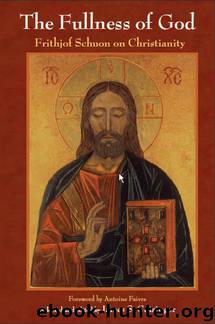The Fullness of God by Schuon Frithjof Cutsinger James S

Author:Schuon, Frithjof,Cutsinger, James S. [Cutsinger, James S.]
Language: eng
Format: epub
ISBN: 9-780941-532587
Publisher: World Wisdom
10
Evidence and Mystery
God created the world out of nothing; this is the teaching of the Semitic theologies, and by it they answer the following difficulty: if God had made the world out of a pre-existing substance, that substance would be either itself created or else divine. The creation is not God; it cannot therefore emanate from Him; there is an unbridgeable hiatus between God and the world; neither can become the other; the orders of magnitude or of reality, or of perfection, are incommensurable.
The main concern of this reasoning is not a disinterested perception of the nature of things, but the safeguarding of a simple and unalterable notion of God, while making allowance for a mentality that is more active than contemplative. The aim is therefore to provide, not a metaphysical statement that does not engage the will or does not appear to do so, but a key notion capable of winning over souls rooted in willing and acting rather than in knowing and contemplating; the metaphysical limitation is here a consequence of the priority accorded to what is effective for the governing and saving of souls. That being so, one is justified in saying that Semitic religious thought is by force of circumstances a kind of dynamic thought with moral overtones, and not a static thought in the style of Greek or Hindu wisdom.
From the point of view of such wisdom, the idea of emanation, in place of creatio ex nihilo, in no way compromises either the transcendence or the immutability of God; between the world and God there is at once discontinuity and continuity, depending on whether our conception of the Universe is based on a scheme of concentric circles or on one of radii extending outward from the center to the periphery: according to the first mode of vision, which proceeds from the created to the Uncreated, there is no common measure between the contingent and the Absolute; according to the second mode of vision, which proceeds from the Principle to its manifestation, there is but one Real, which includes everything and excludes only nothingness, precisely because the latter has no reality whatsoever. The world is either a production drawn from the void and totally other than God, or else it is a manifestation “freely necessary” and “necessarily free” of Divinity or of Its Infinitude, liberty as well as necessity being divine perfections.
As for the contention that the creationist concept is superior to the so-called “emanationist” or “pantheistic” concepts because it is Biblical and Christ-given, and that the Platonic doctrine cannot be right because Plato cannot be superior either to Christ or the Bible, this has the fault of bypassing the real fundamentals of the problem. First, what is rightly or wrongly called “emanationism” is not an invention of Plato’s;1 it can be found in the most diverse sacred texts; second, Christ, while being traditionally at one with the creationist thesis, nevertheless did not teach it explicitly and did not deny the apparently opposite thesis. The message
Download
This site does not store any files on its server. We only index and link to content provided by other sites. Please contact the content providers to delete copyright contents if any and email us, we'll remove relevant links or contents immediately.
The 5 Love Languages: The Secret to Love That Lasts by Gary Chapman(8489)
The Space Between by Michelle L. Teichman(6085)
Assassin’s Fate by Robin Hobb(5235)
Wiseguy by Nicholas Pileggi(4585)
Everything Happens for a Reason by Kate Bowler(4067)
Gerald's Game by Stephen King(3916)
A Simplified Life by Emily Ley(3567)
The Power of Positive Thinking by Norman Vincent Peale(3446)
Pillow Thoughts by Courtney Peppernell(3390)
Resisting Happiness by Matthew Kelly(2885)
Girl, Wash Your Face by Rachel Hollis(2819)
Being Aware of Being Aware by Rupert Spira(2704)
Name Book, The: Over 10,000 Names--Their Meanings, Origins, and Spiritual Significance by Astoria Dorothy(2490)
Real Sex by Lauren F. Winner(2473)
More Language of Letting Go: 366 New Daily Meditations by Melody Beattie(2441)
The Holy Spirit by Billy Graham(2413)
Fast Facts on Defending Your Faith by John Ankerberg & John Weldon(2387)
Victory over the Darkness by Neil T. Anderson(2384)
The Secret Power of Speaking God's Word by Joyce Meyer(2250)
